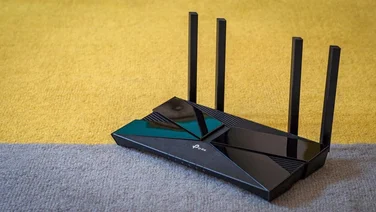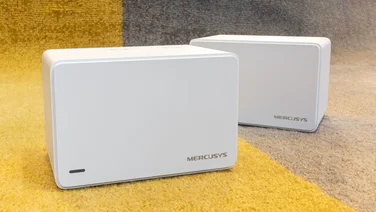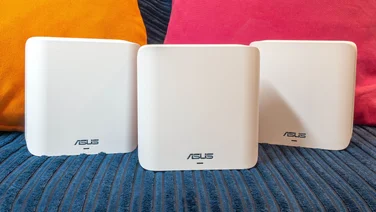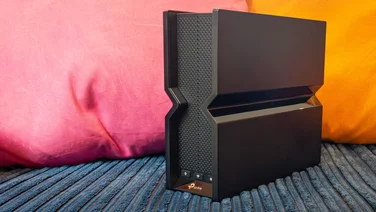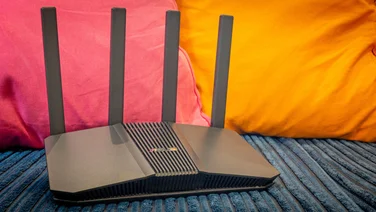To help us provide you with free impartial advice, we may earn a commission if you buy through links on our site. Learn more

Almost every home needs a wireless router. It’s the hub of your online life, allowing computers, tablets, smart TVs, games consoles and more to stay connected to the internet. While you’re in your home, your mobile phone can use your router’s Wi-Fi connection, too, saving your data for when you’re out and about.
Most ISPs will provide a router as part of your home internet service, but these are often quite basic. Buying your own router, from a company such as Asus, Netgear or TP-Link, can give you a faster connection, plus extra features such as parental controls and security scanning.
There are many models to choose from, however – and that’s where our independent reviews come in. We’ve been testing routers more than a decade, so we know what’s a state-of-the-art upgrade, and what’s a waste of money.
Here’s how we test each router that we review, to ensure we always bring you informed reviews and trustworthy recommendations.
Wi-Fi router capabilities
The great thing about Wi-Fi is that it’s both forward- and backward-compatible. You can use an old device with the latest router, or vice versa, and it will all work seamlessly.
However, for the very best performance you’ll need a router that supports the fastest connection standards. Wi-Fi 6 is good, Wi-Fi 6E is a step up and the latest Wi-Fi 7 standard promises to work with the newest, most performance-driven devices.

Different routers also have different maximum connection speeds, and support different numbers of data streams and MIMO (multi-in, multi-out) capabilities. As a result, some perform better than others when handling multiple devices at once, or combining connections to get the fastest download speeds for a single client.
We scour the hardware specification of every router we test, to expose each one’s strengths and weaknesses. And we explain our findings in our full reviews, so you can be confident of choosing a router that fits your needs.
How we test performance
As well as knowing what a router is technically capable of, it’s vital to understand how it performs in the real world. We carry out extensive hands-on testing to find out the overall whole-home download speeds you can expect to see from each router.
We do this by setting up the router in the upstairs study of a real three-bedroom home. If it’s a mesh system, we put the primary station in the study, with a secondary station in the adjoining bedroom; if there’s a third one, it goes downstairs.
We then connect the router or mesh hub to a local NAS appliance – this ensures that our tests can’t be affected by a flaky internet connection. Finally, we take a Windows laptop (equipped with the latest Wi-Fi hardware) around to various rooms in the building, and in each location we connect to the router and copy a series of files to and from the NAS unit, measuring the upload and download speed in megabytes per second (MB/sec).
This gives us a clear, consistent picture of not just of each router’s top speed, but of its ability to deliver a strong signal and a fast connection to all the different areas of your home. We publish our figures in every review, along with performance scores from a selection of alternative products for easy comparison.
Features – what we look for
While the main job of a router is to get all your devices online, many have additional tricks to offer. One common feature is parental controls, which let you disable internet access on children’s devices at times when they should be doing homework, or asleep. Sometimes it’s possible to block inappropriate websites and other content, too, although this may require a paid-for subscription on top of the price of the router.
Another add-on feature is network security, where the router monitors all the devices on your network and warns you of any suspicious activity. Again, this often requires a subscription.

Other extras we look for include guest networks and VPN support. The latter allows you to safely access your home network from elsewhere, or to route your home traffic over a secure server located in a different country. If the router or mesh has USB ports, these will usually allow you to connect an external SSD or flash drive and use it as shared storage for the whole network.
We explore and test all of these extra features, so you know exactly what value-added capabilities each router has to offer.
Ease of use
Routers are high-tech devices, but you don’t want to have to be a scientific genius to operate yours. We set up each router from scratch, using the manufacturer’s recommended method – whether that’s using a web-based wizard or a smartphone app – to experience first-hand how quick and user-friendly the process is.
Once everything’s set up, we also explore the management interface. We’re looking to see how easy it is to find the settings you’ll most commonly want to use, and to make changes. We examine the physical design too – how neatly and conveniently will it fit into your home, and are any buttons and indicator lights clear and self-explanatory? All of these issues factor into our recommendations.
Price
You can pay less than fifty quid for a simple Wi-Fi 6 router, or you can spend well over a grand on the latest multi-station Wi-Fi 7 mesh. Because we’re continually monitoring and testing the whole market of routers, we know a good deal when we see one. All of our reviews include a round-up of competing products in the same price bracket and beyond, to put each product into context – so you can choose the router that’s right for you, without overspending on features and technologies you don’t need.

Conclusion
If you’re looking for your perfect router there are a lot of factors to consider. But because we insist on setting up and testing every model ourselves, we can tell you how each one measures up to the competition.
We explain the technical differences between rival brands – and we share real-world performance figures, so you can see for yourself how each model fares. Whatever your needs, you can rely on Expert Reviews for informed, independent advice that will ensure you get the Wi-Fi router you want at the right price.

